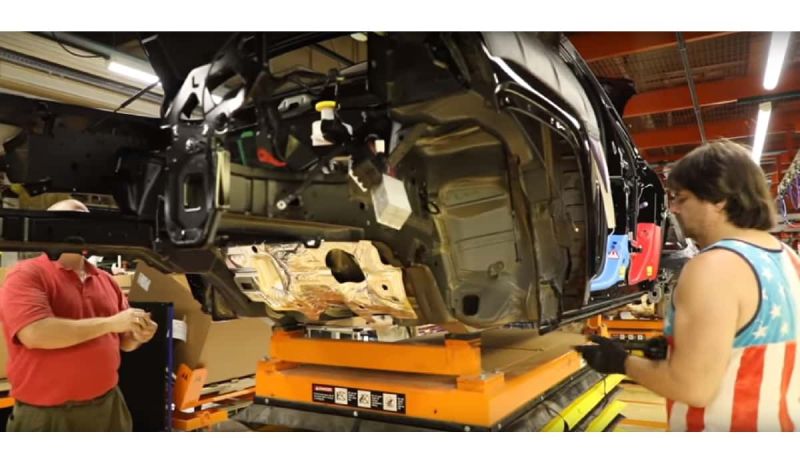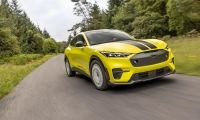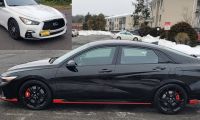The most popular automobiles on the road in America are pickup trucks. Every pickup truck you pass on the way to work, and you pass a lot of them, was protected by a 25% import duty. More specifically, the automaker who built the truck and the jobs of the workers who built that truck were protected by the tariff.
The Current Import Duty On Vehicles Built Overseas
That import duty was proposed by President John F. Kennedy and instituted by President Lyndon Johnson in 1964. It is still in effect today and pickup sales are booming. Automakers cannot build trucks fast enough to satisfy consumer demand. The top three individual models sold in America this month are all models protected by this import duty. They represent one of the largest and most popular segments of the U.S. auto industry. There is not a single model pickup truck sold today that is imported to America from overseas. Toyota, Honda, Nissan, and other automakers all build their trucks in either America or in Mexico and Canada. The 25% import duty exempts Mexico and Canada under the North American Free Trade Agreement. Still, most of the trucks sold in America are designed and built inside of the U.S. These include the Nissan Titan and Honda Ridgeline.
American Made - What Does It Mean?
A good example of an America-made truck is the Jeep Gladiator, America’s newest pickup truck model. It is built in Ohio. Its engine and transmission are also built in America. Many of its other parts are also built inside of the U.S. by suppliers. For example, the soft tops and cargo bed tonneau covers are built in Acton Mass. by Haartz Corporation (building auto parts for over a century in America) and the axles for the vehicle are built in Toledo Ohio.
Related Story: Jeep Proudly Highlights Its Gladiator Pickup's American-Made Manufacturing Roots
The tariff that protects the workers’ jobs who build pickup trucks is officially known as Proclamation 3564. It was instituted by President Johnson in 1964 when a trade dispute between Europe and America could not be resolved via negotiation. Despite it having arisen over a broader dispute, the U.S. has kept the tariff to ensure that America’s most popular vehicles are not imported from overseas.
Imports and National Security
During World War II, American automobile factories were converted to arms factories. The arsenal of democracy produced the planes, tanks, and munitions that won the war. American pickup trucks have fought in every war since, including in Iraq and Afghanistan. The U.S military is currently developing pickup trucks using hydrogen fuel cells. To deny that there isn’t a direct national security link to American vehicle production is absurd. Does importing 400 Hiroshima-plant-built Miatas per month threaten our national security? Of course not.
Other Countries' Import Duties
The U.S. is not the only country that has such import tariffs. European countries and China also have had long-standing import restrictions on automobiles. China’s protections went the farthest, forcing automakers who opted to produce vehicles inside China to partner – and share technology with – a Chinese company. That protectionist policy went unchallenged by America and by other leading automotive producing countries– until 2017 when it was too late. GM is now building crossovers in China and importing them back to the U.S. While closing North American plants.
Tariffs and Innovation
If the 55-year old tariff on imported pickups has stifled innovation it is hard to see how. No other country has any better pickup trucks being sold in any other marketplace. Few have any full-sized “1500” series trucks in service at all. The two newest automotive companies in America are slated to begin producing electric pickup trucks in the next year. Rivian will be producing its trucks in an abandoned Mitsubishi plant in Normal, Ill, and Tesla is likely to build its new truck in an abandoned plant that Tesla obtained from Toyota. Both will be the highest-performance pickup trucks ever produced on Earth by any company. They will also be the most fuel-efficient.
Tariffs On Cars and Car Parts Are Not New
Tariffs on car parts are not new. President Obama was the last U.S. president to institute a tariff on automobile parts. Specifically tires imported from China. President Obama said on the topic of tariffs, "I have made rigorous trade enforcement a central pillar of U.S. trade policy, and we have moved aggressively to protect American workers and to improve labor laws and working conditions with trading partners across the globe.” President Obama felt strongly that U.S. workers were being negatively impacted by very low-cost tires sold into America by China. He moved to protect the American tire industry and the workers.
Are Import Duties A Republican Idea?
If you think Republicans or sitting Presidents are the voice of protectionism, note Senator Elizabeth Warren’s comments this week. She said, “The bottom line is - if they can make a nickel by sending your job somewhere else, they’ll do it. I’ll tell you, these corporations may not fight for American workers, but I’m willing to do it.” She was speaking in Detroit. Senator Warren said she wishes “…“to make it clear that the unified mission of the federal government is to promote sustainable, middle-class American jobs.”
Who Pays For Import Duties?
Critics of tariffs often cite the cost to the consumer. It is true that in most cases an import duty will result in a higher cost to the consumer. However, import duties are paid by companies importing products to the U.S government. This payment is in effect a type of sales tax. Other than fuels, the U.S Federal government does not tax the sale of consumer products directly. While it is true that consumers may pay more, those consumers are also financially benefitting. Both from the tariff payments made, and from the revenue generated by the saved jobs and the income and payroll taxes on those jobs.
There are two sides to the issue of import duties and tariffs on automotive related products. Beware any media reports that lead with “cost to the consumer” and which emphasize “Automakers’ opposition” to such tariffs. Of course, automakers oppose these tariffs. They would prefer to move jobs to locations like Mexico and China where wages are a small fraction of an American living wage, and where environmental and safety regulations can be overlooked. If they even exist.
Vehicle In-Sourcing Works
Toyota and Honda, as well as almost every other "foreign" automaker, have poured billions of dollars into the U.S. economy by in-sourcing jobs here. Most of the leading models in most high-volume vehicle segments are built in America. For example, the Camry, the Accord, the Pilot, and many more high-volume models are built in America. Using primarily American-built engines and transmissions and other parts made in America. These companies do so profitably and have for decades. American states, counties, cities, and towns willingly waive local taxes and fees and invite automakers who wish to build factories with open arms. And with literally billions in financial incentives.
There is no reason why any automaker can’t produce vehicles in America for sale to this market. They have been doing so for a century, and the newest and most exciting automakers like Tesla and Rivian and are opting to locate their factories here.
John Goreham tweets at @JohnGoreham. Please, follow him and send tips.
Set as google preferred source












Comments
Informative article but I
Permalink
Informative article but I think it misses one important point. The tariffs on pickup trucks were FOR A GOOD REASON, not for JFK to pick up votes.
Tariffs are nothing more than another tax. In the case of pickup trucks, if you want a nice, small, very reliable pickup truck, it had to be Japanese and you had to pay a lot for it--the tariff protected the domestic segment of pickup trucks. The reason the tariff was necessary was because the U.S. auto industry was being pummeled nearly to death--mostly because its products weren't very good, or priced too high for what they were. Trump's tariffs make no sense on either end. Domestic products are good and selling well.
Thank you for your comments,
Permalink
In reply to Informative article but I by Joseph Troise (not verified)
Thank you for your comments, Joseph. I didn't realize that folks looked back to the early 1960s auto industry in American and considered a time when it was being "Pummeled." Sales were rising and the big 3 had over 90% market share. Many consider the 1960s the heyday for the US auto industry. I do agree with you that domestic products today are good. However, look at the trends. GM, Ford, and FCA have all quit on family cars. They are shifting to crossovers. One reason is to move away from high-cost labor and high-cost Mfg environments in the U.S. GM's latest crossover models for families, the Encore, the Encore GX, Envision, Trax, Blazer, and Trailblazer - are all made outside of the United States. Ford's newest crossover, the EcoSport, replaces the Focus. It is imported to the U.S. from Romania. FCA's newest generation Jeep Compass is also imported from overseas as is the Renegade. To say that the U.S. auto industry workers are not in need of any protection from imported family vehicles from lower-cost markets without the same environmental and safety standards we insist on in the U.S. seems crazy to me. The evidence is hiding in plain sight. And what better time to dig in one's heels than when the economy is at its strongest?
John,
Permalink
John,
While the auto industry is protected by its share of tariffs as you point out in your well-written article, the issue for the president is more punishment than actual economic advancement. He says that people won''t feel the sting of tariffs -- which they will but that cost will be built into the pricing. He also says that the tariffs won't harm the economy, but they will. As proof that something is happening, the job growth figures for last month were a measly 75,000 jobs. Now, it could be that the lousy weather had a lot to do with the lack of jobs. But, not everywhere in the nation was beset with rain and flooding, and the job growth was very suppressed there. The truer analog to Trump's "tariff policy" honestly goes back nearly a century to the Smooth/Halley tariffs. At the time, the car industry was still building. Ford was building Fords, GM was still building itself into a six-division market leader, and there were other vehicles out there, too. For instance, the Franklin was a very nice car of the 20s. Built in Framingham, MA, it was gone by 1927 because it was just too expensive to be built well away from Detroit which had become the mecca of the auto business. GThe Stanley Company and its steamers -- Newton, Mass. -- was pretty much gone by 1927, except for the leavings. Even the 10-year experiment with Springfield Rolles was done by 1927. The key that drove Smoot and Halley, though, was the distress rising in the economy as the Depression approached. Many of the analogs to the recession of 2008-11 -- crazy credit, poor credit risks, poor banking industry loan policies, and the like -- were there in abundance in the late 20s, including the fact that there was no meaningful centralized banking control. Many of the banks were still family-owned or operated shell games that did little more than abscond with poor folks savings. They invested the money in the stock market which was also overvalued by who knows how many factors of 10. As the economy failed, the lawmakers seized on tariffs as their idea to control and improve, even as the Depression took root and became chronic. Smoot and Halley helped to drive the eonomy over the cliff, which is what Trump's tariff plans do. He claims that other people or countries will pay the tax but that is not exactly true (the authors of the 1920s tariff laws sang similar tunes but they didn't now any better; the president should.). Now, I have no idea of the impact of Trump's plans, but I do know this much, they are more disruptive and destructive. It would be as if the country suddenly did away with even a modicum of progressive taxation through the tax code and adopted a silly flat tax or value-added tax to pay the federal bills. Only the people at the top don't feel the bite of the flat tax or VAT. The people at the bottom and middle feel it. This is the type of situation that Trump's "beautiful tariffs" bring. Though he considers the tariffs "beautiful," they are not and never will be. Yes, they will cause lots of pain and more.